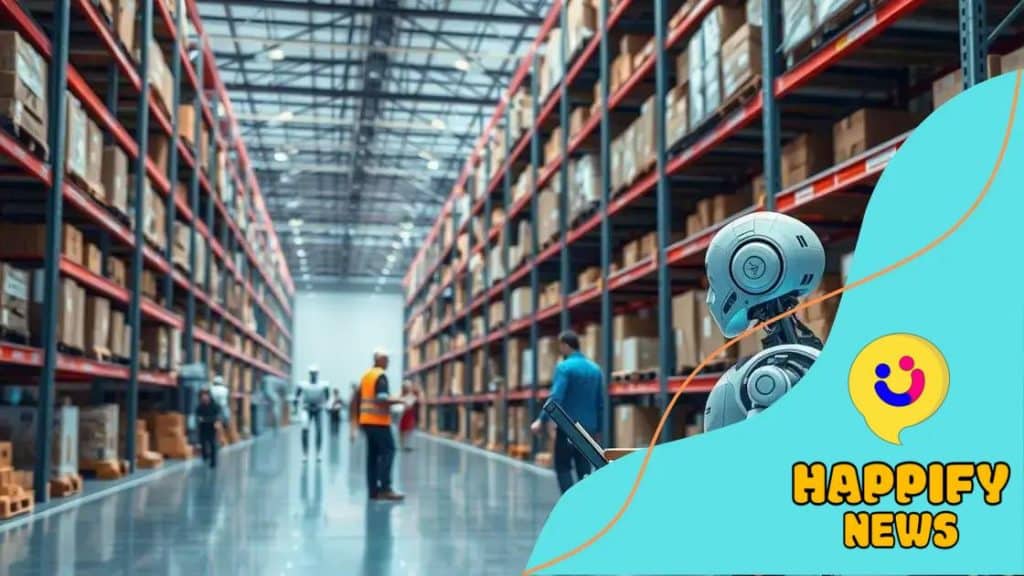AI improving supply chain efficiency: a game changer

Anúncios
AI is transforming supply chain efficiency by automating processes, enhancing data analytics, and promoting sustainability, leading to faster operations and reduced costs for businesses.
AI improving supply chain efficiency is reshaping the logistics landscape. Have you ever wondered how technology can streamline operations and cut costs? This article dives into innovative ways AI is being utilized in supply chains today.
Anúncios
Understanding AI’s role in supply chains
Understanding AI’s role in supply chains is essential to grasping how technology can enhance efficiency. As businesses integrate AI into their operations, they uncover innovative methods to streamline processes and reduce costs.
How AI Transforms Supply Chain Management
AI doesn’t just automate existing processes; it revolutionizes them. With capabilities such as predictive analytics and real-time data processing, AI helps companies anticipate needs, optimize inventory levels, and enhance customer satisfaction.
Key Benefits of AI in Supply Chains
- Improved efficiency: AI technologies analyze data quickly, allowing for faster decision-making.
- Cost reduction: By optimizing routes and inventory, businesses can lower their operational expenses.
- Enhanced accuracy: Real-time tracking reduces errors and improves inventory management.
- Increased flexibility: AI can adapt to changes in demand and supply, offering better scalability.
Supply chain professionals can leverage AI to uncover trends and insights that were previously hidden. For instance, AI algorithms can analyze sales patterns to forecast future demand. This proactive approach can significantly enhance supply chain resilience.
Anúncios
Moreover, AI supports better collaboration across departments. With integrated platforms, teams can access shared data and reports, leading to more effective communication and coordination. This results in a unified strategy and a smoother overall operation.
As we delve further into the capabilities of AI, it is clear that the technology empowers companies to make data-driven decisions. By integrating AI tools, organizations can stay ahead of market changes and respond to challenges swiftly.
In conclusion, AI’s role in supply chains is not merely reactive; it is a proactive force shaping the future of logistics.
Key benefits of AI in logistics management
Understanding the key benefits of AI in logistics management opens the door to improved operations. AI enhances various aspects of logistics, leading to smarter decisions and better efficiency.
Efficiency and Speed
AI algorithms can process data at incredible speeds. This capability allows logistics companies to optimize routes and improve delivery times. By analyzing traffic patterns and weather conditions, AI ensures that shipments arrive on time.
Cost Reduction
Integrating AI into logistics can significantly lower operational costs. This technology can help manage inventory more effectively, reducing excess stock and preventing shortages.
- Predictive analytics: AI forecasts demand, enabling better inventory planning.
- Automated routing: AI systems generate the best delivery routes, minimizing fuel consumption.
- Labor optimization: AI can aid in workforce management, ensuring staff levels meet operational needs.
Another advantage is enhanced accuracy in all areas of logistics. From order processing to inventory tracking, AI reduces human error by automating these tasks. Real-time data analytics provide insights that help managers make informed decisions quickly.
AI also promotes flexibility. As market demands shift, AI can adapt logistics strategies accordingly. For instance, if demand spikes unexpectedly, AI can adjust delivery schedules and resource allocation seamlessly.
Moreover, the incorporation of AI leads to improved customer satisfaction. With faster and more reliable deliveries, companies can respond better to customer needs. This boost in performance enhances customer loyalty and drives repeat business.
Overall, AI’s innovative capabilities transform logistics management, making it not only efficient but also forward-thinking.
Real-world examples of AI improving efficiency

Looking at real-world examples of AI improving efficiency helps us understand its significant impact across industries. Companies are leveraging AI to streamline operations and enhance productivity.
Case Study: Amazon
Amazon uses advanced AI algorithms in its logistics to manage inventory and optimize delivery routes. By analyzing vast amounts of data, Amazon predicts what products will be in demand, helping keep their warehouses stocked properly.
Case Study: Walmart
Walmart employs AI in various areas, including supply chain management. They use machine learning to forecast demand and analyze customer purchasing habits. This data-driven approach allows them to streamline stock levels and reduce waste.
- Reducing Waiting Times: By employing AI chatbots, companies can address customer inquiries quickly, improving service.
- Smart Logistics: AI in logistics helps companies manage deliveries more efficiently, minimizing delays and enhancing customer satisfaction.
- Predictive Maintenance: Many manufacturers use AI to predict equipment failures, which helps reduce downtime and maintenance costs.
Furthermore, the automotive industry has seen remarkable changes due to AI. Companies like Tesla use AI for autonomous driving and enhancing manufacturing processes. This technology allows for safer vehicles and more efficient production lines.
AI’s role in healthcare also showcases its efficiency. For instance, diagnostic AI systems analyze medical images, leading to faster and more accurate diagnoses. This technology enables doctors to provide better care and make informed decisions swiftly.
Throughout various sectors, it is evident that AI not only improves operational efficiency but also drives innovation, making businesses more competitive in the market.
Challenges in implementing AI solutions
Implementing AI solutions presents various challenges that organizations must navigate. Understanding these obstacles can help prepare businesses for successful integration.
Data Quality and Availability
One major challenge is ensuring data quality. AI systems rely on large amounts of data to function effectively. If this data is inaccurate or incomplete, it can lead to poor decision-making.
Cultural Resistance
Another significant hurdle is cultural resistance within organizations. Employees may feel threatened by AI tools or skeptical about their benefits. Overcoming this resistance is crucial for a smooth transition.
- Training Needs: Employees may require training to adapt to AI technologies, which can be time-consuming and costly.
- Integration with Existing Systems: Merging AI solutions with current systems can be technically challenging and may require additional resources.
- Cost of Implementation: The initial investment for AI technology can be high, deterring some companies from proceeding.
Moreover, regulatory issues can also present challenges. Companies must ensure compliance with data protection laws, which can vary by region. These regulations may impose restrictions on how data is collected and used, making it complicated to implement AI solutions effectively.
Additionally, choosing the right technology can be daunting. With numerous AI tools and platforms available, organizations may struggle to identify which solution best meets their needs. This selection process can lead to delays in deployment and implementation.
Finally, organizations need to continuously monitor and update their AI systems. AI technology evolves rapidly, and keeping up with these advancements can be resource-intensive, requiring ongoing investments in infrastructure and talent.
Future trends in AI for supply chains
Exploring future trends in AI for supply chains reveals exciting possibilities that can reshape the logistics landscape. As technology continues to advance, businesses need to stay informed about emerging trends to remain competitive.
Increased Automation
One significant trend is the rise of automation across supply chains. Using AI, companies can automate various processes such as order fulfillment, inventory management, and logistics routing. This results in faster operations and fewer errors.
Enhanced Data Analytics
AI will lead to more advanced analytics tools that provide deeper insights into supply chain performance. These tools can analyze complex data sets in real-time, helping businesses make better decisions.
- Predictive Analytics: Future AI systems will predict trends, allowing companies to anticipate demand and adjust accordingly.
- Intelligent Forecasting: Enhanced algorithms will improve forecasting accuracy, reducing surplus and stockouts.
- Dynamic Pricing: AI will enable real-time adjustments in pricing based on demand and market conditions.
Moreover, sustainability will play a crucial role in the future of supply chains. AI can help companies optimize resource use, reduce waste, and lower carbon footprints. This focus on sustainability is essential as consumers increasingly prefer environmentally friendly brands.
Collaboration between machines and humans is another key trend. AI will augment human capabilities, allowing for more efficient decision-making. For example, AI can highlight potential supply chain disruptions, enabling teams to respond proactively.
Finally, the integration of AI with IoT devices will enhance connectivity across supply chains. Data from sensors and connected devices will feed AI systems, providing a comprehensive view of logistics operations. This interconnectedness will lead to smarter supply chains that respond quickly to changes.
In conclusion, AI is transforming supply chains in numerous ways. This technology enhances efficiency, reduces costs, and improves decision-making. As we look to the future, trends like increased automation, better data analytics, and a focus on sustainability will continue to shape the logistics landscape. Embracing these changes will be essential for businesses to remain competitive and meet the evolving needs of consumers.
FAQ – Frequently Asked Questions about AI in Supply Chains
How does AI improve efficiency in supply chains?
AI streamlines operations by automating tasks, optimizing routes, and providing real-time data insights, leading to faster deliveries and reduced costs.
What are some challenges of implementing AI in supply chains?
Challenges include data quality, cultural resistance among employees, high implementation costs, and the need for integration with existing systems.
What future trends should businesses look for regarding AI in logistics?
Future trends include increased automation, enhanced data analytics, sustainability initiatives, and better collaboration between AI and human workers.
Can small businesses benefit from AI in their supply chains?
Yes, small businesses can leverage AI to improve efficiency, reduce costs, and enhance customer satisfaction without requiring massive investments.






